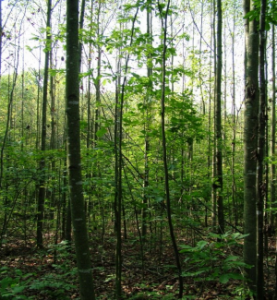 Purdue University - Extension - Forestry and Natural Resources
Purdue University - Extension - Forestry and Natural Resources
Got Nature? Blog
Forest management in the eastern United States is faced with many modern challenges. Professional foresters have an innovative set of management options for the maintenance of healthy forest ecosystems. But some options raise public objections when applied to public lands (e.g., types of timber harvest, prescribed fire) and the effects of some management options on forests and their native inhabitants are poorly understood. Moreover, forest lands in the eastern and Midwestern United States primarily are in small privately-owned parcels that change ownership relatively frequently. These lands are often managed for short-term financial gains rather than long-term sustainability.
As populations of some forest organisms decline, restrictions on landowners may increase because species become classified as endangered or threatened (e.g., the Indiana bat), while increasing populations of other species (white-tailed deer, invasive plants) create economic and ecological challenges. These problems are compounded by the lack of scientifically rigorous research on the overall impacts of forest management on the effected ecosystems and their components. To address this set of issues, the Hardwood Ecosystem Experiment (HEE), a long-term, large-scale experimental study of forest management and its impacts, was initiated in 2006.
 Many of Indiana’s forests have been dominated by oak and hickory trees for thousands of years. The historical conditions that shaped today’s forests have changed, altering forest composition and leading land managers to wonder what can be done to maintain oak and hickory forests for the future. The Hardwood Ecosystem Experiment: 2006-2016 provides an overview of findings for the first 10 years of the HEE, 100 year project.
Many of Indiana’s forests have been dominated by oak and hickory trees for thousands of years. The historical conditions that shaped today’s forests have changed, altering forest composition and leading land managers to wonder what can be done to maintain oak and hickory forests for the future. The Hardwood Ecosystem Experiment: 2006-2016 provides an overview of findings for the first 10 years of the HEE, 100 year project.
To learn more about this 100 year forest management plan and see its impacts, check out the Hardwood Ecosystem Experiment website.
If you would like to start receiving “The HEE Update,” please email Charlotte Owings, the HEE project coordinator, at freemac@purdue.edu. If you do not have an email address, you may still receive the newsletter by regular postal mail – call Charlotte Owings at 765-494-1472.
Resources:
The Hardwood Ecosystem Experiment website
The Hardwood Ecosystem Experiment: 2006-2016, The Education Store, Purdue Extension resource center
The Hardwood Ecosystem Experiment: Indiana Forestry and Wildlife, The Education Store
Hardwood Ecosystem Experiment – Wildlife Responses to Timber Harvesting, The Education Store
Hardwood Ecosystem Experiment – Sustaining Our Oak-Hickory Forests, The Education Store
Hardwood Ecosystem Experiment – Forest Birds, Purdue Extension-FNR YouTube Playlist
Invasive Plants: Impact on Environment and People, The Education Store
The Great Clearcut Controversy, The Education Store
Charlotte Owings, Hardwood Ecosystem Experiment (HEE) Project Coordinator
Purdue Forestry and Natural Resources

Recent Posts
- From Forest to Classroom – 2024 NRTI Class
Posted: July 26, 2024 in Community Development, Forestry, Urban Forestry, Wildlife - Virtual Tour Brings Forest Management for Birds to Life
Posted: July 19, 2024 in Forestry, How To, Publication, Wildlife - Summer Tree Care – Purdue Landscape Report
Posted: July 16, 2024 in Forestry, Forests and Street Trees, How To, Plants, Urban Forestry - DNR State Deer Biologist Shares Population Ecology of Deer-IFWOA Webinar
Posted: July 12, 2024 in Forestry, Wildlife, Woodlands - Buoys Keep Eye on Great Lake Conditions
Posted: July 11, 2024 in Aquatic/Aquaculture Resources, Great Lakes, How To - ID That Tree: Learn to Identify Conifer Leaf Types
Posted: in Forestry, Forests and Street Trees, How To, Urban Forestry, Wildlife - ID That Tree: Types of Broadleaved Tree Leaves
Posted: July 10, 2024 in Forestry, Forests and Street Trees, How To, Plants, Wildlife - 2024 Turkey Brood Count Wants your Observations – MyDNR
Posted: June 28, 2024 in Alert, Community Development, Wildlife - Case Study: Maple Tree Pests – Purdue Landscape Report
Posted: June 26, 2024 in Disease, Forests and Street Trees, Plants, Spiders, Urban Forestry, Wildlife, Woodlands - Woodland Management Moment: Oak Regeneration – Protecting Seedlings
Posted: June 24, 2024 in Forestry, Urban Forestry, Wildlife, Woodland Management Moment, Woodlands
Archives
Categories
- Alert
- Aquaculture/Fish
- Aquatic/Aquaculture Resources
- Ask the Expert
- Christmas Trees
- Community Development
- Disease
- Drought
- Forestry
- Forests and Street Trees
- Gardening
- Got Nature for Kids
- Great Lakes
- How To
- Invasive Animal Species
- Invasive Insects
- Invasive Plant Species
- Land Use
- Natural Resource Planning
- Nature of Teaching
- Plants
- Podcasts
- Ponds
- Publication
- Safety
- Spiders
- Timber Marketing
- Uncategorized
- Urban Forestry
- Webinar
- Wildlife
- Wood Products/Manufacturing
- Woodland Management Moment
- Woodlands